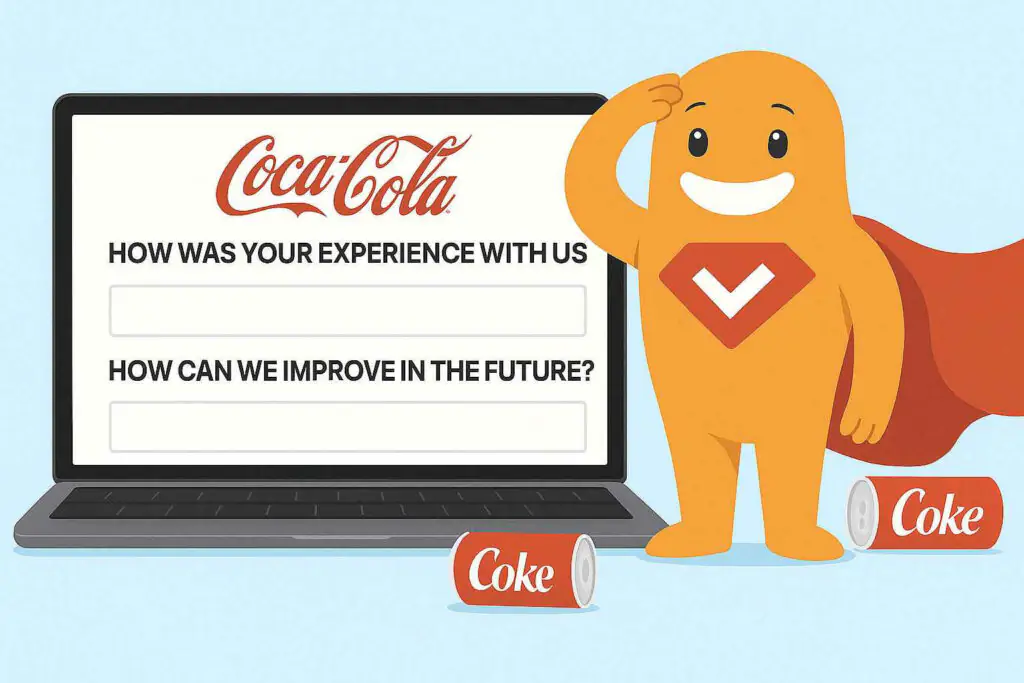Are you sitting down for this? Studies show that 86% of new hires quit their job within the first six months of employment. With the Society for Human Resource Management (SHRM) also reporting that the average cost-per-hire is more than $4,100, hiring – and subsequently losing employees – can become very costly. That’s not all; losing new hires results in lost productivity and expenses in hiring, recruiting, and training replacements, and can lead to poor employee morale and a damaged reputation with clients.
Create your new hire survey, questionnaire, or poll now!
One way companies can mitigate the turnover of new hires is through proper onboarding, which includes using an employee new hire survey.
Turnover of New Hires
When a new hire begins, they typically receive orientation meetings, printed materials, videos, and computer-based training. Unfortunately, new research shows that these methods of onboarding are failing. In fact, 16.45% of new employees quit within the first week. Here’s the breakdown of when people leave a new position by month according to Inc.:
- First month: 17.42%
- Second month: 16.77%
- Third month: 17.42%
- Fourth month: 10.97%
- Fifth month: 05.48%
- Sixth month: 14.48%
Those are pretty frightening statistics, especially when considering the cost of bringing onboard each new hire. So why are people leaving so soon?
What New Hires Want
According to a BambooHR survey, some new hires feel neglected, overwhelmed, under-appreciated, and underqualified. On their wishlist for new job onboarding, respondents said they wanted:
- On-the-job training. This training should be thorough, extend beyond the first week, and include a 30-day review of orientation.
- Review of company policies and company tour. Content in an “employee handbook” must be relevant, clear, and organized, and a subsequent tour, including equipment setup and company procedures, is also important.
- Having a mentor. When new hires work with a mentor they get more attention and recognition. It also helps introduce them to others within the company, offering more complete socialization and acceptance.
Of course, even with all of this in place, it’s difficult to know if a new hire is feeling welcome and confident in their new role. A new hire survey is one way to get some answers.
What is a New Hire Survey?
A new-hire survey, or employee onboarding survey, is a questionnaire companies use to gain insight into an employee’s experience during their first months on the job. There is a lot on a new hire’s plate, and an onboarding survey offers a systemized way to check in with them. It also provides valuable information about the new hire experience that you can use to improve the onboarding experience for future hires.
Benefits of a New Hire Survey
Here are four ways conducting a new hire experience survey can benefit new hires, existing employees, and your company as a whole.
Improving Your Onboarding Process
Are there any negatives regarding certain aspects of your onboarding procedure that come up frequently on new hires surveys? Does one type of position (for example, sales) tend to compliment the onboarding process, while another (for example, designers) tend to criticize it? The insights you uncover from new hire surveys can help you to refine the onboarding process and ensure it is as efficient as possible for everyone, regardless of position.
Improving Employee Retention
Onboarding challenges can leave new hires feeling frustrated and overwhelmed. Often, there can be a disconnect between an employee’s expectations and their actual experience, as well as the caliber of training and relationships with managers and colleagues. When expectations aren’t met, this often leads to attrition. If a company acts quickly upon learning of new hire unrest on an onboarding survey, they can make adjustments that can boost new hire satisfaction and morale, improving employee retention.
Improving Team Morale
A bad onboarding process can wind up impacting an entire team, especially when the process results in a lot of turnover. An existing team may make accommodations for the new hire, help with training, get to know them — and then the new hire leaves, and the process repeats. This can dampen morale, and over time existing employees will become less enthusiastic about new hires, believing it will once again be short-lived. This can impede company growth and reputation.
Getting More Honest Answers
Some companies have potential new hires fill out a questionnaire before being hired to gauge their interests and fit. Therefore, a follow-up survey may reveal some new truths (people tend to be more honest after securing a job). If there are major discrepancies, have a conversation with the new hire about why. You may also discover that the new hire is more ambitious in their career goals than they initially stated, leading you to consider a more advanced track to management, etc.
New Hire Survey Considerations
A new hire survey is just one part of a larger new hire orientation program; it can’t be a substitute for training, mentorship, and other activities. However, when used correctly, a new hire survey can fit seamlessly into any onboarding process. Here are a few things to keep in mind.
Use an Online New Hire Survey
In this day and age, this may sound like a no-brainer, but an online survey streamlines the process and makes it easier to gather and share results. It’s also helpful if you’re working at a company that hires batches of new employees at certain times of the year; this makes it easier to analyze responses. Check out the advantages of online surveys here.
Explain the New Hire Survey’s Purpose
As with any survey, it’s a best practice to explain the purpose of the survey and how you will use the results. You can also explain how this will benefit the new hires and future new hires. This will help garner more thoughtful, honest responses. Also, be sure to let the new hire know who the results will be shared with; will it stay within HR, or go to their direct manager? While this may seem counterintuitive to obtaining honest answers, disclosing this information upfront will lay a foundation of trust in your feedback culture.
Keep New Hire Surveys Short
New hires already feeling overwhelmed, so don’t make the new hire survey overly long or complicated. Keep the questions focused and relevant, otherwise, the new hire may feel like it is simply a waste of time, and you don’t want to start off with employees thinking their time is not valued. We recommend aiming for 15 minutes or less to complete a new hire survey. Some companies conduct a new hire survey each month for the first 3-6 months; if you choose this type of onboarding surveying, you may want to make them shorter.
Make New Hire Surveys Actionable
The biggest benefit of new hire surveys is improving the onboarding process, thus improving new hire retention. So, design questions that management can actually act upon. For example, consider these questions:
- I understand this organization’s culture, mission, and values. If a new hire answers no, management needs to find a way to better communicate these ideals.
- I have the materials and equipment I need to do my job. If a new hire answers no, management needs to follow up by asking what material or equipment is needed, and be prepared to supply it.
We’ll cover additional new hire survey sample questions in the next section.
Always Follow Up!
Nobody wants their time to go to waste. Even if a survey was anonymous, a manager can always ask a new hire whether they had any questions or concerns about the onboarding survey that they would like to discuss.
If the survey was not anonymous or confidential, and this was disclosed in the introduction (survey purpose), then HR or a direct manager may choose to hold a quick one-on-one with the new hire to discuss any issues and find solutions to any challenges. Both options demonstrate to new hires that the company is interested in their success and open to meaningful, ongoing dialogue.
40 Sample Onboarding Survey Questions for New Hire Surveys
Part of creating a good onboarding experience is asking the right questions on your employee onboarding survey. We’ve broken these new hire survey sample questions out into categories, as well as when they may be most appropriate to ask if you’re planning on conducting multiple surveys during the initial months of employment (you can of course change the timing of these surveys at your discretion, for example, conducting a first-week survey, a 90-day survey, and a 6-month survey).
Remember, new hire onboarding survey questions are bi-directional; that is, you’re requesting employee feedback, but you’re also telling them what the company thinks is important by virtue of the questions asked.
Week One: Recruitment Experience and Initial Impressions
- Why did you want to join this company?
- Were you provided accurate information about the company during the recruitment process?
- Have the goals and objectives of your onboarding been clear?
- Do you understand what is expected of you in your new position?
- Have the company’s culture, mission, and values been communicated to you?
- Were questions you had about new hire orientation been answered to your satisfaction?
- Was enough information provided on employee benefits?
- Were you given a tour of the company/facilities?
- Were you introduced to your co-workers?
- Was your direct manager present on your first day of work?
Month One: Job Duties and Management Impressions
- Are your job responsibilities what you would expect?
- Do you feel you’re able to do what is expected with your current skills and abilities?
- Has the training you received so far been effective?
- Do you have the materials and equipment you need to do your job?
- Are you receiving timely and valuable feedback on your work?
- Have your co-workers made you feel welcome?
- Are you comfortable reaching out to coworkers with questions?
- Has your direct manager made you feel welcome?
- Do you feel your direct manager has been helpful in trying to make you succeed in your new position?
- Are you comfortable expressing work-related concerns with your direct manager?
Month Two: Professional and Personal Growth
- Do you feel accepted by your co-workers?
- Do you feel you can depend on the other members of your team?
- Is Communication effective among those who impact your ability to do your job?
- Do you feel your direct manager cares about your professional development?
- Do you feel your direct manager cares about your personal growth?
- Have your experiences so far have matched your expectations?
Month Three: Goals and Work Performance
- Do you feel that goals and accountabilities are clear to everyone on your team?
- Do you clearly understand how we measure performance?
- Does your work motivate you?
- Do you feel valued in your current position?
- Are you able to utilize your strengths in your position?
- Do you understand the company’s plans for future success and the role you play in that?
Month Six: Continued Engagement
- Are you proud to work for this company?
- Would you recommend this company as a great place to work?
- Have you considered looking for another job?
- Do you see yourself working for this company in two years? Five years or more?
- Has your experience so far matched your expectations?
- Is there something we could have done to improve the recruitment process?
- Do you feel the company’s onboarding process is effective?
- What’s one thing we could have done differently to improve your onboarding experience?
Conclusion
Onboarding new employees can be a time-consuming process. Bringing the wrong employee into the fold, or delivering a poor onboarding experience, can result in turnover that can cost money, lower team morale, and damage company reputation. So, you want to make sure you get your new employee onboarding right! One way to do this is by conducting new hire surveys and asking the right onboarding survey questions. Start with SurveyLegend, your ideal online survey platform, delivering professionally-designed templates that you can use to create your new hire survey. Get started today!
Do you conduct new hire surveys as part of your onboarding process? Are there some onboarding survey questions you think we should include on our list? We’d love to hear from you in the comments!
Create your new hire survey, questionnaire, or poll now!
Frequently Asked Questions (FAQs)
Attrition of newly hired employees in week one is more than 16%. This rate holds relatively steady during the first six months of employment.
Surveys reveal that new hires want on-the-job training, a review of company policies and a company tour, and a dedicated mentor.
A new-hire survey, or employee onboarding survey, is a questionnaire companies use to gain insight into an employee’s experience during their first months on the job.
New hire surveys can improve employee retention, team morale, and the onboarding process as a whole. New hire surveys also tend to get more honest feedback, as employees who have secured their new job are more likely to be honest than those applying for it.





